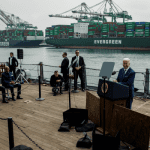Japan’s Chief Cabinet Secretary Yoshimasa Hayashi announced that three prominent Hamas members would have their assets frozen and that they would be subject to restrictions on their ability to make payments and transfer money.
According to a senior Japanese government spokesperson, the three people were thought to have been involved in the October 7 Hamas attack on Israel and to be able to utilize money to fund such terrorist acts.
Tokyo slapped sanctions on nine individuals and a corporation in October due to their purported affiliation with Hamas, prompting this action.
Meanwhile, Tokyo has attempted to walk a fine line on the war in Gaza, striving to balance relations with the United States, its closest ally, and its ties to energy-supplying partners in the Middle East.
Kishida Fumio, Japan’s Prime Minister, condemned the October 7 assaults on Israel and demanded the quick release of Hamas hostages, while also expressing worry over civilian casualties and the deteriorating humanitarian situation in Gaza.
Japan also voted in favor of a UN General Assembly resolution asking for a “immediate humanitarian ceasefire” in Gaza earlier this month, after abstaining from a similar vote in October.
According to reports, Japanese container shipper Ocean Network Express indicated last week that it will reroute vessels away from the Red Sea to avoid being attacked by Yemen’s Houthi rebels, who have increased attacks on commercial shipping since the beginning of the Gaza war.
Japan’s Chief Cabinet Secretary Yoshimasa Hayashi announced that three prominent Hamas members would have their assets frozen and that they would be subject to restrictions on their ability to make payments and transfer money.
According to a senior Japanese government spokesperson, the three people were thought to have been involved in the October 7 Hamas attack on Israel and to be able to utilize money to fund such terrorist acts.
Tokyo slapped sanctions on nine individuals and a corporation in October due to their purported affiliation with Hamas, prompting this action.
Meanwhile, Tokyo has attempted to walk a fine line on the war in Gaza, striving to balance relations with the United States, its closest ally, and its ties to energy-supplying partners in the Middle East.
Kishida Fumio, Japan’s Prime Minister, condemned the October 7 assaults on Israel and demanded the quick release of Hamas hostages, while also expressing worry over civilian casualties and the deteriorating humanitarian situation in Gaza.
Japan also voted in favor of a UN General Assembly resolution asking for a “immediate humanitarian ceasefire” in Gaza earlier this month, after abstaining from a similar vote in October.
According to reports, Japanese container shipper Ocean Network Express indicated last week that it will reroute vessels away from the Red Sea to avoid being attacked by Yemen’s Houthi rebels, who have increased attacks on commercial shipping since the beginning of the Gaza war.
Japan’s Chief Cabinet Secretary Yoshimasa Hayashi announced that three prominent Hamas members would have their assets frozen and that they would be subject to restrictions on their ability to make payments and transfer money.
According to a senior Japanese government spokesperson, the three people were thought to have been involved in the October 7 Hamas attack on Israel and to be able to utilize money to fund such terrorist acts.
Tokyo slapped sanctions on nine individuals and a corporation in October due to their purported affiliation with Hamas, prompting this action.
Meanwhile, Tokyo has attempted to walk a fine line on the war in Gaza, striving to balance relations with the United States, its closest ally, and its ties to energy-supplying partners in the Middle East.
Kishida Fumio, Japan’s Prime Minister, condemned the October 7 assaults on Israel and demanded the quick release of Hamas hostages, while also expressing worry over civilian casualties and the deteriorating humanitarian situation in Gaza.
Japan also voted in favor of a UN General Assembly resolution asking for a “immediate humanitarian ceasefire” in Gaza earlier this month, after abstaining from a similar vote in October.
According to reports, Japanese container shipper Ocean Network Express indicated last week that it will reroute vessels away from the Red Sea to avoid being attacked by Yemen’s Houthi rebels, who have increased attacks on commercial shipping since the beginning of the Gaza war.
Japan’s Chief Cabinet Secretary Yoshimasa Hayashi announced that three prominent Hamas members would have their assets frozen and that they would be subject to restrictions on their ability to make payments and transfer money.
According to a senior Japanese government spokesperson, the three people were thought to have been involved in the October 7 Hamas attack on Israel and to be able to utilize money to fund such terrorist acts.
Tokyo slapped sanctions on nine individuals and a corporation in October due to their purported affiliation with Hamas, prompting this action.
Meanwhile, Tokyo has attempted to walk a fine line on the war in Gaza, striving to balance relations with the United States, its closest ally, and its ties to energy-supplying partners in the Middle East.
Kishida Fumio, Japan’s Prime Minister, condemned the October 7 assaults on Israel and demanded the quick release of Hamas hostages, while also expressing worry over civilian casualties and the deteriorating humanitarian situation in Gaza.
Japan also voted in favor of a UN General Assembly resolution asking for a “immediate humanitarian ceasefire” in Gaza earlier this month, after abstaining from a similar vote in October.
According to reports, Japanese container shipper Ocean Network Express indicated last week that it will reroute vessels away from the Red Sea to avoid being attacked by Yemen’s Houthi rebels, who have increased attacks on commercial shipping since the beginning of the Gaza war.
Japan’s Chief Cabinet Secretary Yoshimasa Hayashi announced that three prominent Hamas members would have their assets frozen and that they would be subject to restrictions on their ability to make payments and transfer money.
According to a senior Japanese government spokesperson, the three people were thought to have been involved in the October 7 Hamas attack on Israel and to be able to utilize money to fund such terrorist acts.
Tokyo slapped sanctions on nine individuals and a corporation in October due to their purported affiliation with Hamas, prompting this action.
Meanwhile, Tokyo has attempted to walk a fine line on the war in Gaza, striving to balance relations with the United States, its closest ally, and its ties to energy-supplying partners in the Middle East.
Kishida Fumio, Japan’s Prime Minister, condemned the October 7 assaults on Israel and demanded the quick release of Hamas hostages, while also expressing worry over civilian casualties and the deteriorating humanitarian situation in Gaza.
Japan also voted in favor of a UN General Assembly resolution asking for a “immediate humanitarian ceasefire” in Gaza earlier this month, after abstaining from a similar vote in October.
According to reports, Japanese container shipper Ocean Network Express indicated last week that it will reroute vessels away from the Red Sea to avoid being attacked by Yemen’s Houthi rebels, who have increased attacks on commercial shipping since the beginning of the Gaza war.
Japan’s Chief Cabinet Secretary Yoshimasa Hayashi announced that three prominent Hamas members would have their assets frozen and that they would be subject to restrictions on their ability to make payments and transfer money.
According to a senior Japanese government spokesperson, the three people were thought to have been involved in the October 7 Hamas attack on Israel and to be able to utilize money to fund such terrorist acts.
Tokyo slapped sanctions on nine individuals and a corporation in October due to their purported affiliation with Hamas, prompting this action.
Meanwhile, Tokyo has attempted to walk a fine line on the war in Gaza, striving to balance relations with the United States, its closest ally, and its ties to energy-supplying partners in the Middle East.
Kishida Fumio, Japan’s Prime Minister, condemned the October 7 assaults on Israel and demanded the quick release of Hamas hostages, while also expressing worry over civilian casualties and the deteriorating humanitarian situation in Gaza.
Japan also voted in favor of a UN General Assembly resolution asking for a “immediate humanitarian ceasefire” in Gaza earlier this month, after abstaining from a similar vote in October.
According to reports, Japanese container shipper Ocean Network Express indicated last week that it will reroute vessels away from the Red Sea to avoid being attacked by Yemen’s Houthi rebels, who have increased attacks on commercial shipping since the beginning of the Gaza war.
Japan’s Chief Cabinet Secretary Yoshimasa Hayashi announced that three prominent Hamas members would have their assets frozen and that they would be subject to restrictions on their ability to make payments and transfer money.
According to a senior Japanese government spokesperson, the three people were thought to have been involved in the October 7 Hamas attack on Israel and to be able to utilize money to fund such terrorist acts.
Tokyo slapped sanctions on nine individuals and a corporation in October due to their purported affiliation with Hamas, prompting this action.
Meanwhile, Tokyo has attempted to walk a fine line on the war in Gaza, striving to balance relations with the United States, its closest ally, and its ties to energy-supplying partners in the Middle East.
Kishida Fumio, Japan’s Prime Minister, condemned the October 7 assaults on Israel and demanded the quick release of Hamas hostages, while also expressing worry over civilian casualties and the deteriorating humanitarian situation in Gaza.
Japan also voted in favor of a UN General Assembly resolution asking for a “immediate humanitarian ceasefire” in Gaza earlier this month, after abstaining from a similar vote in October.
According to reports, Japanese container shipper Ocean Network Express indicated last week that it will reroute vessels away from the Red Sea to avoid being attacked by Yemen’s Houthi rebels, who have increased attacks on commercial shipping since the beginning of the Gaza war.
Japan’s Chief Cabinet Secretary Yoshimasa Hayashi announced that three prominent Hamas members would have their assets frozen and that they would be subject to restrictions on their ability to make payments and transfer money.
According to a senior Japanese government spokesperson, the three people were thought to have been involved in the October 7 Hamas attack on Israel and to be able to utilize money to fund such terrorist acts.
Tokyo slapped sanctions on nine individuals and a corporation in October due to their purported affiliation with Hamas, prompting this action.
Meanwhile, Tokyo has attempted to walk a fine line on the war in Gaza, striving to balance relations with the United States, its closest ally, and its ties to energy-supplying partners in the Middle East.
Kishida Fumio, Japan’s Prime Minister, condemned the October 7 assaults on Israel and demanded the quick release of Hamas hostages, while also expressing worry over civilian casualties and the deteriorating humanitarian situation in Gaza.
Japan also voted in favor of a UN General Assembly resolution asking for a “immediate humanitarian ceasefire” in Gaza earlier this month, after abstaining from a similar vote in October.
According to reports, Japanese container shipper Ocean Network Express indicated last week that it will reroute vessels away from the Red Sea to avoid being attacked by Yemen’s Houthi rebels, who have increased attacks on commercial shipping since the beginning of the Gaza war.














